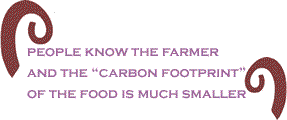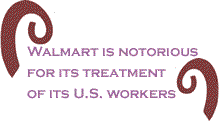The
world�s largest retail department store and supermarket
discount chain announced this month that it has launched
a global commitment to a program of buying and selling that
is designed to help sustainable agriculture grow and, in
particular, to help small and medium sized farmers survive
and grow.

In
making the announcement from its worldwide headquarters
in Bentonville,
Arkansas, officials of the company
noted that �more than 1 billion people around the world
rely on farming and hundreds of millions of them live on
less than $2 a day.�
It�s
nice that Walmart is making a commitment to help those folks,
but how are they going to do it? They don�t say, so be very
careful not to take this at face value.
�Through
sustainable agriculture, Walmart is uniquely positioned
to make a positive difference in food production - for farmers,
communities, and customers,� said Mike Duke, president and
CEO. �Our efforts will help increase farmer incomes, lead
to more efficient use of pesticides, fertilizer and water,
and provide fresher produce for our customers.�
With
millions in the U.S. and around the world becoming more concerned
every year about the source of their food - there is a widely
embraced �know your farmer� movement in the U.S. - the growth of the organic food industry
is rapid and continuing. Also, it has not escaped the notice
of giant food corporations who would like to cash in on
what is becoming an international trend.
The
problem is that, in the U.S.
at least, the percentage of organic food and beverage sales
stands at about 3.7 percent of overall food sales, according
to the 2010 industry survey of the Organic Trade Association.
 If
organic sales are not growing as fast as it could, it�s
probably because the number of organic farms is not growing
fast enough to fill the demands of a populace that is more
and more concerned about the quality of their food. If
organic sales are not growing as fast as it could, it�s
probably because the number of organic farms is not growing
fast enough to fill the demands of a populace that is more
and more concerned about the quality of their food.
There
are many reasons for that impeded growth, but the main reason
is that the U.S. is officially not that friendly to small
farm agriculture. It prefers the giant operations that are
conducted on an industrial scale. It just easier to gather
the food, distribute it, and retail it that way, and all
of that can be done by giant corporations like Walmart.
As long as the reliance on a cheap source of petro-chemicals
and cheap labor is discounted, they can claim some sort
of efficiency in their operations.
Organic
farming is that which is done without the use of chemical
fertilizers, chemical pesticides, herbicides, and fungicides,
as well as with an aim toward constantly improving the soil
and the general health of the farm. Also, ideally, organic
farming is done in such a way that it provides healthy working
conditions, pays a living wage, and improves the community
in which it is practiced. A farm can be certified after
inspection and interviews show that the farm meets the standards
that are now maintained by the U.S. Department of Agriculture.
In
recent years, in an effort to improve the likelihood that
small farm agriculture will grow in America, there has been
an addition to organics as a desirable way to farm and it
is called �sustainable,� which is defined by USDA as �an
integrated system of plant and animal production practices
having a site-specific application that will over the long-term:
Satisfy human food and fiber needs, enhance environmental
quality and the natural resource base upon which the agriculture
economy depends, make the most efficient use of nonrenewable
resources and on-farm resources and integrate, where appropriate,
natural biological cycles and controls, sustain the economic
viability of farm operations, and enhance the quality of
life for farmers and society as a whole.�
 Unlike
organic farms, the use of some chemicals in sustainable
farming is not prohibited and the general practice appears
to be aimed at maintaining and encouraging growth of small
farms - all a part of the �buying local� campaign that has
spread across the country. Sustainably produced food that
comes from local farms, therefore, has begun to move in
on purely organic food production as a desirable farming
system. One of its features is that people know the farmer
and the �carbon footprint� of the food is much smaller,
not having to travel across the continent or oceans to be
sold at retail. Unlike
organic farms, the use of some chemicals in sustainable
farming is not prohibited and the general practice appears
to be aimed at maintaining and encouraging growth of small
farms - all a part of the �buying local� campaign that has
spread across the country. Sustainably produced food that
comes from local farms, therefore, has begun to move in
on purely organic food production as a desirable farming
system. One of its features is that people know the farmer
and the �carbon footprint� of the food is much smaller,
not having to travel across the continent or oceans to be
sold at retail.
Although
Walmart a few years ago announced that it was launching
a significant campaign to sell organic food in its thousands
of stores in the U.S. (it has 8,400 stores in 15 countries
and employs some 2 million workers), the effort to go organic
in that many stores must have run into the stone wall of
the limited number of organic farms in this country and
the effort was just allowed to fade away. They could have
bought organic food from places like China, but there are too many questions about
who does the organic certification and under what conditions.
�Sustainable�
is easier to handle and there are many more farms worldwide
that would meet at least some of the standards and allow
Walmart to retail the food from them as part of their big
�sustainability� effort.
But,
Walmart�s history has to be considered in their announced
plan. As the world�s biggest retailer, the company has been
able to dictate terms to every supplier, no matter where
in the world they are located. They have been able to continually
hammer sweatshops in low-wage countries to lower their costs
even more. The only place these suppliers can cut costs
is to reduce pay to a minimum and, even, to steal wages
from workers by making them work �off the clock.�
 Walmart
has not hesitated to exercise its immense power in the global
marketplace. This is a company that, for years, advertised
that its goods were �USA made,� prided itself on its support for American
companies and American workers. When minimum wage laws and
other labor laws, as well as other factors were seen as
hindering the maximization of profits, they just began to
get their goods from low-wage countries. Soon, all of their
goods were from those countries, just as with thousands
of other American corporations. Walmart
has not hesitated to exercise its immense power in the global
marketplace. This is a company that, for years, advertised
that its goods were �USA made,� prided itself on its support for American
companies and American workers. When minimum wage laws and
other labor laws, as well as other factors were seen as
hindering the maximization of profits, they just began to
get their goods from low-wage countries. Soon, all of their
goods were from those countries, just as with thousands
of other American corporations.
Officials
announcing the new �sustainable agriculture goals� noted
that �more than 1 billion people around the world rely on
farming and hundreds of millions of them live on less than
$2 a day,� and they intend to give them a leg up, in places
like India and China. Walmart has had something to do with
that on $2 a day, along with other companies that have exploited
the peoples of scores of countries over many years. As well,
Walmart is notorious for its treatment of its U.S. workers - low pay, no pay (working off the
clock), and benefits that amount to little, if anything.
It is one of the most notorious anti-union companies in
a nation full of anti-union, anti-worker companies.
In
fact, the Walmart was criticized roundly a few years ago,
when it was discovered that it was taking out term life
insurance policies on its workers, with the company as sole
beneficiary. The insurance paid off, even if the worker
was no longer employed by Walmart when he or she died. Even
in death, the Walmart worker simply became an asset - a
cipher - and the insurance payoff was added to the profit
side.
How
much differently will Walmart be treating small- and medium-sized
farmers? Will the company be looking for the lowest prices?
If it is willing to pay what amounts to a living wage to
farmers, it will mean a change in the entire culture of
the corporation and that�s not an easy thing to do. In virtually
every place where they have put one of their stores (and
they�re everywhere), small businesses have fallen by the
wayside, with just a few exceptions. How will small, sustainable
and organic farmers be treated when it comes to price?

Right
now, they are talking a good game. For example, not only
are they promising to increase the income of small farmers
it buys from by 10-15 percent (that won�t be hard in India
or China, where farmers are often destitute), but they promise
to do things like only buy beef that comes from farms that
do not add to the deforestation of the Amazon. And officials
of the firm leave out that, in India, for example,
600 million of 1.1 billion people are directly tied to farming.
There, even mighty Walmart will barely make a dent.
Nothing
is enough for transnational corporations like Walmart. It
is making its moves on Africa, with a $4 billion offer earlier
this month to buy Massmart, South Africa�s
third-largest retailer, according to Reuters. If it were
to be successful, it would not only be a power in South
Africa, but would have, according to
the news service, �a foothold in 13 other countries in sub-Saharan
Africa.� Also, an emerging middle class
in Africa, generally, will provide
a consumer base of 1 billion, it was reported.
Considering
the global �land grab� that is now under way in developing
countries, Walmart�s sustainability campaign might just
make certain that the largest retailer will not be left
out, when it comes to exploiting the land that is ripe for
the picking. Developed or industrialized or �first world�
nations that are running out of room to grow their own food
- or didn�t have any to begin with - are buying up or long-term
leasing land in Africa and South America to raise food to
ship back to their own countries.
Like
most announcements ushered in with great fanfare, Walmart�s
sustainability program needs to be studied carefully to
see what is behind the public relations and press releases,
because what�s good for Walmart is not necessarily good
for the country or the world.
BlackCommentator.com
Columnist, John Funiciello, is a labor organizer and former
union organizer. His union work started when he became a
local president of The Newspaper Guild in the early 1970s.
He was a reporter for 14 years for newspapers in New York State. In
addition to labor work, he is organizing family farmers
as they struggle to stay on the land under enormous pressure
from factory food producers and land developers. Click here
to contact Mr. Funiciello. |

